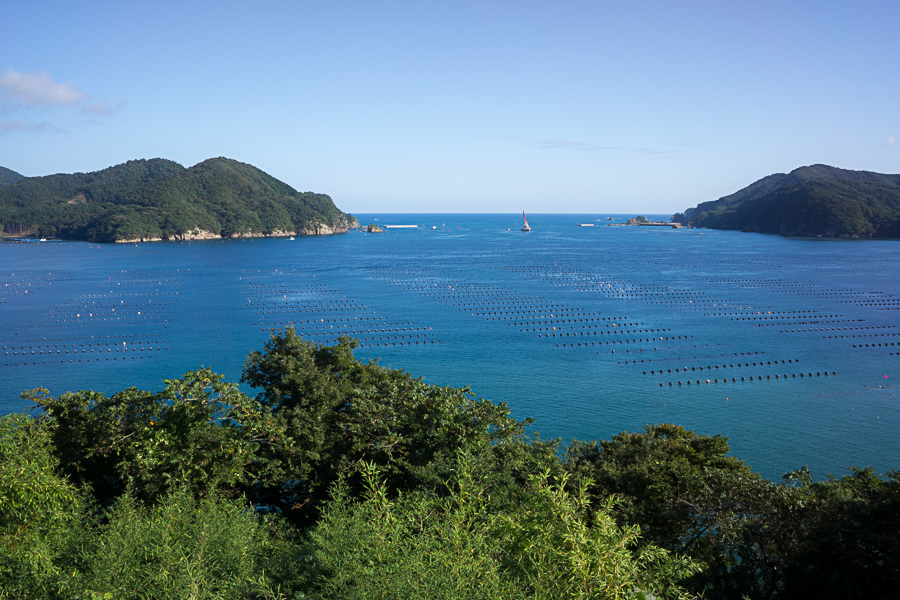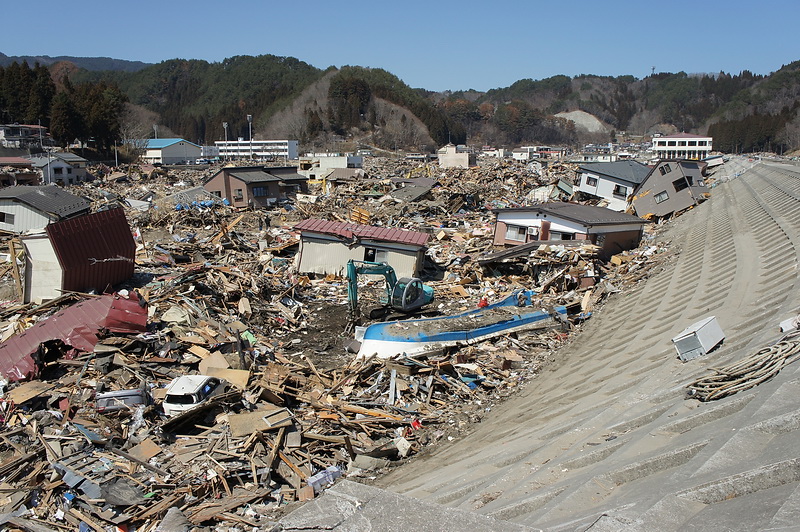The first day I heard Mr. Gotoh’s story. He’s in his seventies and on March 11th, 2011 he was at a sporting event when the earthquake struck. He rushed back to his home, hoping to find his pet cat named Peter. When he got there the river next to his house was already a foot higher than normal. A few minutes later a seven foot wave surged up the river, reversing the current and carrying mountains of debris with it. That was when he spotted Peter clinging to a scrap of debris floating in the water. He jumped into the surging waves and swam for the cat, but after going 15 feet he started getting sucked under and started swallowing water. He reluctantly cried out, “Don’t give up, Peter!” and turned around, now swimming for his life. Sixty feet later he finally reached higher ground and was able to drag himself out of the freezing water. He doesn’t remember what happened after that, but the next day as he sifted thru the carnage of his own neighborhood he learned that his home was completely washed away and in its place lay a stranded ship! And then in the midst of all the debris he found Peter, too weak to even move or meow. Mr. Gotoh tenderly took Peter to the local vet where he was treated for a broken leg and hypothermia. In retrospect he realizes that his desire to save the cat almost cost him his life. And yet he boldly proclaims that “God in heaven came to my rescue and commanded me to live a long life!” I can’t help but think and hope that Mr. Gotoh will also have a life changing encounter with Jesus now that he has been given more time here on earth.
On the second day we were at a temporary housing complex near a small fishing harbor. Almost all the residents are somehow connected with the fishing industry. In the Ofunato bay there is a lot of aqua-culture, growing oysters and sea-weed. These businesses were hit hardest, having lost all their infrastructure; all the nets and buoys, all the boats, all the harbor facilities, all the warehouses; everything! Two and a half years later they are finally starting to get back on their feet but the recovery is far from complete. Yet, imagine my surprise when several of them stated that the current crop of oysters are bigger, juicier and tastier than they ever were before the tsunami! The theory is that the destruction of the sea-walls at the mouth of the harbor has improved the water circulation in the bay, and that the force of the tsunami sort of swept clean the sea-floor in the harbor, leaving it cleaner and more nutrient rich than ever before. We church folk like to talk about all things working together for good, and the power of the resurrection that can bring new life from the ashes of death, disaster and sorrow. On Wednesday I was privileged to hear a similar message of renewal and re-birth in the face of unspeakable tragedy, and interestingly it was coming from people who have yet to hear that message from God’s Word. Could it be that God is preparing their hearts for an encounter with His Word?
On the third day we visited with more tsunami survivors who talked about losing their waterfront homes and anticipating the chance to rebuild on higher ground. Government red-tape has slowed the process and many of the older residents in temporary housing seriously question whether they will ever get the opportunity to rebuild. We talked about how the sea-walls had failed to protect their homes and the need to re-build and reinforce them. To my surprise everyone there said they didn’t want any more sea-walls.
The logic was pretty simple… for these people who have lived by the sea for generations, keeping an eye on the water is second nature. People like me have romantic notions about how nice it would be to live by the sea and have a view of the water, but for these residents it is far more pragmatic. They instinctively keep an eye on the sea for their own safety. The idea of building a 10 meter sea-wall was completely unacceptable to these survivors because “then you can’t see the water, and have no idea what’s coming your way.” They added, “it just creates a false sense of security” and were clear that they would prefer being able to see what’s coming. Some of the world’s best sea-walls are right here in Iwate, and yet for those who have experienced the failure of such monumental protection systems, there is a deep seeded suspicion of any attempt to beat mother nature at her own game. These voices of reality force me to think more deeply about the numerous ways in which we try to guarantee our own safety, our own security, and our own prosperity in this world. How often do those pathetic attempts simply blind us to the truth and create a false sense of security?
In the afternoon of the fourth day we visited a small temporary housing complex and spent time with some of the local residents doing simple crafts, sharing a word of scripture and testimony with them and just enjoying our time together. In addition to the elderly ladies there was one 24 year old man and his 2 year old daughter participating. He was a profoundly friendly, cheerful and upbeat guy, which was particularly striking because his daughter clearly suffers some sort of profound mental and physical disability. Her name is Azusa.
Mid-way thru the event the young mother showed up and dropped off their one year old son as well. It was with considerable shock that I observed that the son also suffers similar disabilities. His name is Choki. Of course the elderly women treat both kids like angels and are absolutely delighted to have little children in their midst. The young parents are a healthy, attractive and cheerful couple who have been given an incredibly difficult task of raising two disabled children who are less than one year apart in age. On March 11, 2011 the mother was 4 months pregnant with Azusa and had left the area to spend time at her parents’ home, as many Japanese women do when they are pregnant. Her husband stayed behind in Ofunato to work and his place of employment was in the hardest hit area of the city. She immediately assumed that her husband was dead. With all communications cut off it was a full three weeks before he was able to contact her and let her know that she wasn’t a widow and wouldn’t be raising their child as a single parent. Having lost their home and his previous job, they have been living in temporary housing for the past two years, where they have welcomed these two dear children into a world turned upside-down by the disaster. Our hearts were struck by their cheerful spirit! At the end of our time together we sang a song with these dear people; and it was “Jesus Loves Me”. My understanding of those simple lyrics took on new meaning today as I sang the familiar words, “Little ones to him belong; They are weak but he is strong.” Azusa and Choki are indeed weak in many ways, and yet Jesus is strong, and Jesus loves them dearly. I pray that their entire family will encounter the infinite love of Jesus Christ in a way that will give new meaning to their lives.
Tomorrow morning we will leave Ofunato to return to our homes. Once again I leave this place having received far more than I could ever give.






I will add Azusa and Choki to my prayer list and their parents also. Peace
Report This Comment
01.16.14 at 4:06 pm
thank you for sharing.
Report This Comment
03.11.15 at 5:08 am